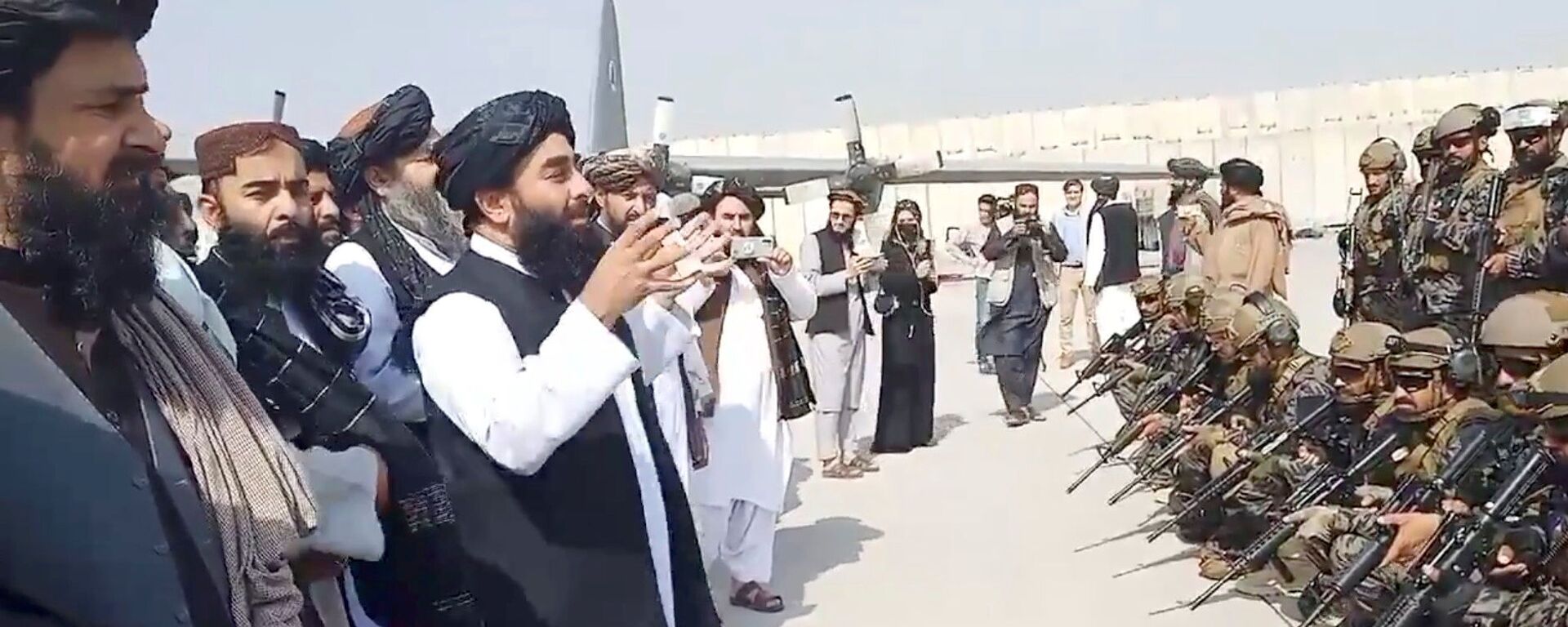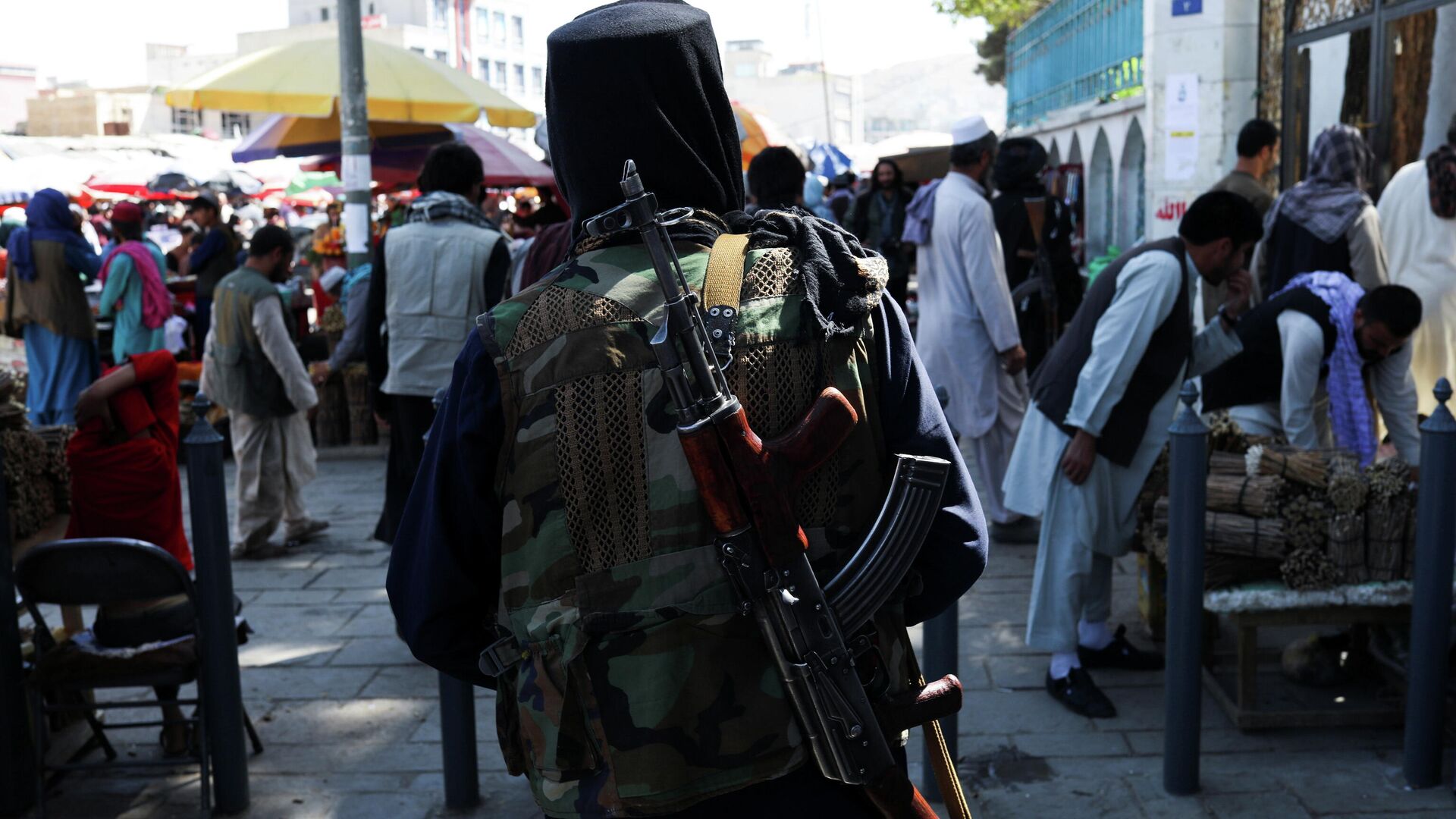https://sputnikglobe.com/20210923/cutting-off-hands-necessary-for-security-taliban-founder-says-brutal-punishment-wont-go-away-1089348704.html
'Cutting Off Hands Necessary for Security': Taliban Founder Says Brutal Punishment Won't Go Away
'Cutting Off Hands Necessary for Security': Taliban Founder Says Brutal Punishment Won't Go Away
Sputnik International
Taliban Founder Says Brutal Punishments Won't Go Away
2021-09-23T20:01+0000
2021-09-23T20:01+0000
2021-09-23T20:00+0000
afghanistan
asia
afghanistan
taliban
corporal punishment
punishment
capital punishment
https://cdn1.img.sputnikglobe.com/img/07e5/09/12/1089196425_0:160:3072:1888_1920x0_80_0_0_7c63683640c222b46ce79ec48962ecea.jpg
The Taliban* will reportedly not end the use of the Sharia law punishments it adopted during its previous five-year rule in Afghanistan, between 1996 and 2001, even though many are frowned upon by other countries, according to a founding member, Mullah Nooruddin Turabi, in an interview with the AP. Turabi, who formerly served as justice minister and now oversees the prisons in the new Taliban government, noted, however, that these punishments may no longer be public.In the 1990s, the Taliban used a Kabul sports stadium and the grounds of the Eid Gah mosque to hold various punishments, including amputations for theft and robbery, and execution for those convicted of murder. The resurrection of these traditions has attracted criticism from the international community, which earlier vowed to pressure the Taliban into moderating its practices. Turabi, however, warned foreign countries against pursuing this diplomatic approach.The issue of the public punishment is reportedly being discussed in the new government, and some things will change, compared to the previous Taliban rule, Turabi noted in an interview with a female journalist – an action he harshly denounced in 1996. The Afghan prison minister claimed that the Taliban has "changed from the past", noting the group's embrace of modern technology to spread its fundamentalist religious message.There is, however, a possible side effect to this change – if punishments are held in public, they might also be streamed online to expand the alleged deterring effect. Turabi claims:Another notable change compared to the 1990's Taliban rule is that under the new government convictions will be handled by judges in courts, although the rulings will still be based on Sharia law, Turabi said. In the past, Islamic clergy largely managed convictions, which were held out of the public eye.The new prisons minister, however, defended the brutal practices of the group, claiming that they in the past they achieved "safety in every part of the country".*The Taliban is a terrorist organisation banned in Russia and many other countries
https://sputnikglobe.com/20210923/taliban-plans-to-form-commission-in-2022-to-draft-new-constitution-1089342831.html
afghanistan
Sputnik International
feedback@sputniknews.com
+74956456601
MIA „Rossiya Segodnya“
2021
Tim Korso
https://cdn1.img.sputnikglobe.com/img/07e6/03/0d/1093831826_0:0:216:216_100x100_80_0_0_e3f43a960af0c6c99f7eb8ccbf5f812c.jpg
Tim Korso
https://cdn1.img.sputnikglobe.com/img/07e6/03/0d/1093831826_0:0:216:216_100x100_80_0_0_e3f43a960af0c6c99f7eb8ccbf5f812c.jpg
News
en_EN
Sputnik International
feedback@sputniknews.com
+74956456601
MIA „Rossiya Segodnya“
Sputnik International
feedback@sputniknews.com
+74956456601
MIA „Rossiya Segodnya“
Tim Korso
https://cdn1.img.sputnikglobe.com/img/07e6/03/0d/1093831826_0:0:216:216_100x100_80_0_0_e3f43a960af0c6c99f7eb8ccbf5f812c.jpg
taliban founder says brutal punishments won't go away
taliban founder says brutal punishments won't go away
'Cutting Off Hands Necessary for Security': Taliban Founder Says Brutal Punishment Won't Go Away
A veteran of the insurgent group, who oversees prisons in the new temporary Afghanistan government, believes in the efficacy of brutal punishment, which often includes execution or severe mutilation of the body for serious crimes.
The Taliban* will reportedly not end the use of the Sharia law punishments it adopted during its previous five-year rule in Afghanistan, between 1996 and 2001, even though many are frowned upon by other countries, according to a founding member, Mullah Nooruddin Turabi, in an interview with the AP. Turabi, who formerly served as justice minister and now oversees the prisons in the new Taliban government, noted, however, that these punishments may no longer be public.
In the 1990s, the Taliban used a Kabul sports stadium and the grounds of the Eid Gah mosque to hold various punishments, including amputations for theft and robbery, and execution for those convicted of murder. The resurrection of these traditions has attracted criticism from the international community, which earlier vowed to pressure the Taliban into moderating its practices. Turabi, however,
warned foreign countries against pursuing this diplomatic approach.
"Everyone criticized us for the punishments in the stadium, but we have never said anything about their laws and their punishments. No one will tell us what our laws should be. We will follow Islam and we will make our laws on the Quran".
The issue of the public punishment is reportedly being discussed in the new government, and some things will change, compared to the previous Taliban rule, Turabi noted in an interview with a female journalist – an action he harshly denounced in 1996. The Afghan prison minister claimed that the Taliban has "changed from the past", noting the group's embrace of modern technology to spread its fundamentalist religious message.
There is, however, a possible side effect to this change – if punishments are held in public, they might also be streamed online to expand the alleged deterring effect. Turabi claims:
"Cutting off of hands is very necessary for security".
Another notable change compared to the 1990's Taliban rule is that under the new government convictions will be handled by judges in courts, although the rulings will still be based on Sharia law, Turabi said. In the past, Islamic clergy largely managed convictions, which were held out of the public eye.

23 September 2021, 15:25 GMT
The new prisons minister, however, defended the brutal practices of the group, claiming that they in the past they achieved "safety in every part of the country".
*The Taliban is a terrorist organisation banned in Russia and many other countries




